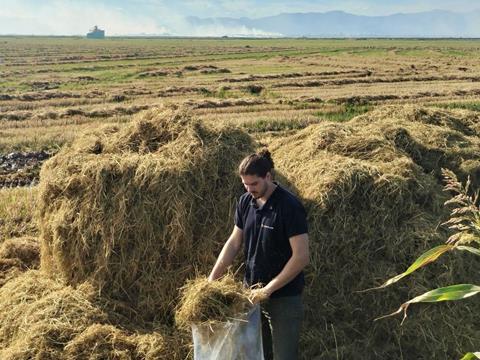
In a new project, AIMPLAS plans to use solvent-free mechanochemical techniques to turn plant waste into packaging and adhesives, keeping harmful substances out of landfill and the natural environment.
Lignocellulosic waste, or plant waste from agriculture and forestry, is generated in large amounts in the agri-food, wood, and furniture sectors. Most of it currently ends up in landfill, AIMPLAS explains, which harms the environment and human health.
In response, the FUSTARISE project intends to use mechanochemical techniques to transform this waste into capsules, adhesives, and other bio-based products. Funded by the Valencian Institute of Business Competitiveness (IVACE), it involves a collaboration between AIMPLAS, adhesive and abrasive product specialist MIARCO, food-contact paper and packaging company LISART, and Valencian farmer and livestock breeder coalition La Unió Llauradora i Ramadera.
Lignin, hemicellulose, and cellulose will undergo conventional, mechanochemical, and bio-enzymatic treatments, which will then be developed and scaled up to pre-industrial level. They are hoped to be integrated into the waste production and management sectors as a competitive alternative to conventional methods, while the recovered biopolymers will be reprocessed into a range of new products.
Mechanochemistry is thought to cut down on solvent and reagent consumption, in turn reducing their toxic effects on the environment and wildlife. It also claims to require less energy and water, lower gas emissions, and reduce the amount of waste generated.
The FUSTARISE project is included in the IVACE aid programme for technology centres in the Valencia region. It funds non-economic R&D projects carried out in collaboration with companies for the 2023 financial year, and is financed by the European Union’s European Regional Development Fund (ERDF) within the framework of the 2021-2027 Operational Programme.
“Thanks to this IVACE-funded project, we can move towards a circular economy based on waste lignocellulosic materials that can form part of the industrial context of the Valencian Community,” explained Giacomo Marra, researcher in Mechanochemistry and Reactive Extrusion at AIMPLAS. “Efficient and sustainable recovery of the lignin, hemicellulose and cellulose contained in this waste enables us to obtain high value-added products that can be exported to the market as biosustainable and eco-sustainable alternatives, thus reducing the environmental impact.
“The recovery of lignocellulosic waste using solvent-free methods is an innovative approach. Applying cleaner techniques is a promising alternative that can reduce dependence on traditional disposal methods and promote long-term competitiveness and sustainability.
“Moreover, the development of innovative products from this waste can replace conventional petroleum-based approaches, reduce dependence on fossil fuels and promote a more sustainable future.”
In related news, traceless reached the finals of the Sustainability Awards 2023 for its plastic alternative made from agricultural plant residues. The nomination came after the German start-up received €5 million in funding from The German Federal Ministry for the Environment, Nature Conservation and Nuclear Safety (BMUV)’s Environmental Innovation Program, with the money set to help build a demonstration production plant in Hamburg.
Meanwhile, ELEMIS and Xampla have manufactured sampling sachets for skincare products from biofilm made using leftover waste from ELEMIS’ plant crops.
If you liked this article, you might also enjoy:
The Lidl approach to packaging sustainability
How did Brazil achieve its 100% aluminium can recycling rate – and can it be replicated in the EU?
Experts have their say on the EU’s Packaging and Packaging Waste Directive revisions
A deep dive into the most important packaging sustainability trends and solutions














No comments yet